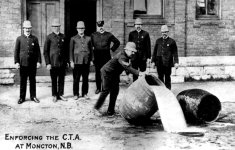They saw that no one cared, except them, about the closures of the stores...so now they'll ramp up the pressure.Now the LCBO employee are picketing the distribution centres that supply bars and restaurants. Is fair and legal and really pissing off people is how you get what you want .
I can’t wait to get more supply directly through wineries and small distilleries. I’ll gladly pay all taxes , and I’ll pay a premium. I really don’t like unions , mostly when many restaurants barely made it through the last 4 yrs , let’s make life harder for mom’s and pops and entrepreneurs.
Sent from my iPhone using GTAMotorcycle.com
The union stated they're ready to last a LONG time in a strike position. I wonder if their members feel the same when their lack of pay starts catching up.
I posted the same on reddit and got down voted to hell and back. But it's reality. Just because the union can withstand an extended strike...doesn't mean the workers can.
And I support the rights of unions and workers all around, but you need to act in the best interest of the workers...not the union.
























